In der Reihe ZMO-Studien werden innovative Forschungsarbeiten zum Nahen Osten, Afrika sowie Süd-, Südost- und Zentralasien veröffentlicht. Im Mittelpunkt stehen dabei die historischen und aktuellen transregionalen Beziehungen, die aus unterschiedlichen disziplinären und interdisziplinären Perspektiven betrachtet werden. Die in der Reihe veröffentlichten Monographien und Sammelbände illustrieren und ergänzen das Forschungsprofil des ZMO. Die ZMO-eigene Schriftenreihe wird seit 2019 vom Verlag Walter de Gruyter publiziert. Seit 2020 wird die Reihe open access publiziert.
ZMO-Studien
Aktuelle ZMO-Studie Nr. 47

Katja Föllmer, Lisa Maria Franke und Ramzi Ben Amara
Mit Unterstützung von Laura Stauth
Rethinking the Anthropology of Islam Dynamics of Change in Muslim Societies
In Honour of Roman Loimeier
The contributions of this volume discuss the broad field of transformation processes in Muslim societies from different perspectives with various disciplinary approaches. Apart from methodological questions the authors investigate religious and social developments in Africa and the Near and Middle East while focusing e.g. on the production of meaning, negotiation of religious values and spaces, gendered agency, and debates of identity.
Leibniz-Zentrum Moderner Orient
Geisteswissenschaftliche Zentren Berlin e.V.
ZMO-Studien 47
2024
503 Seiten
De Gruyter
ISBN 9783111302263
FLYER
Aktuelle ZMO-Studie Nr. 46
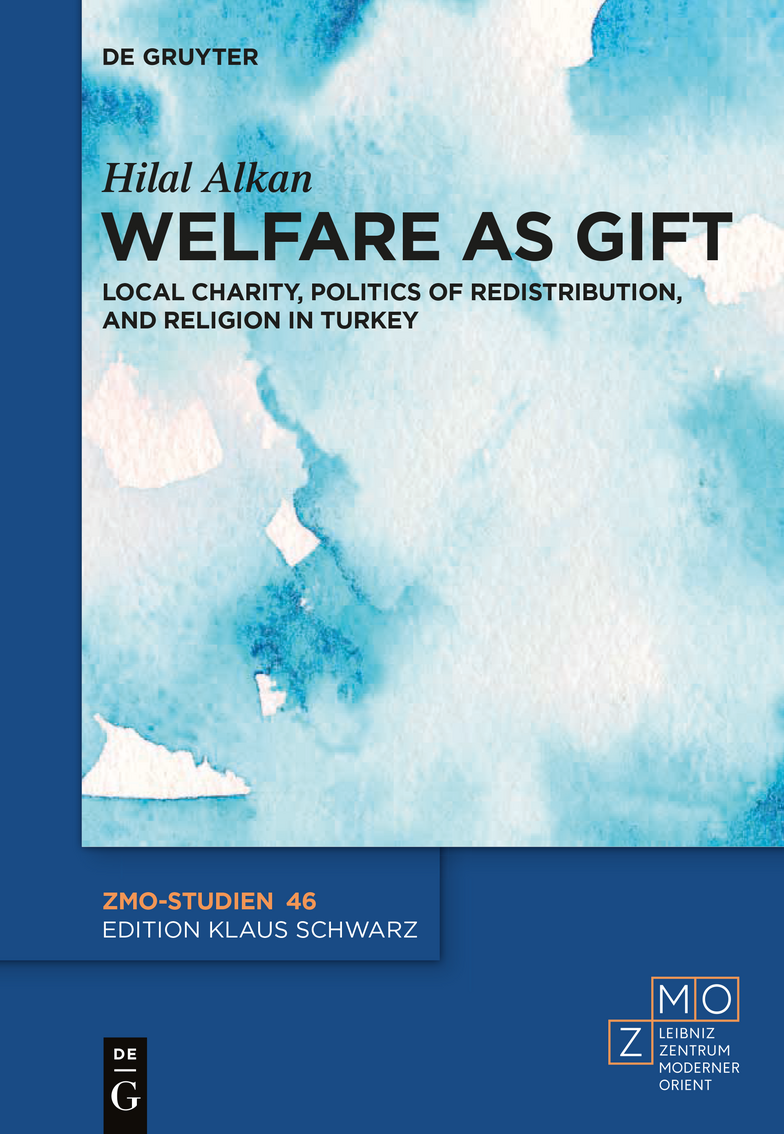
Hilal Alkan
Welfare as Gift
Local Charity, Politics of Redistribution, and Religion in Turkey
The welfare regime in Turkey has been undergoing a radical transformation since the early 2000s. Welfare provisions, especially poverty alleviation schemes, are increasingly framed as gifts, and select civil society organisations have assumed the state’s welfare provision functions through non-transparent public funding. Waqf, the Islamic institution of endowment, has played an important role in this transformation. It provides both the institutional frame of operations and the religious imaginary signification that interpellates subjects to take part as givers and receivers of gifts. This material exchange of care and money through newly configured gift-relations between the providers and beneficiaries constitutes not only a realm of politics but also a site of ethical negotiations with embodied consequences.
This book is based on an extensive ethnographic study conducted between 2008-2009 among the charitable organizations of Kayseri, a central Anatolian city with booming industry and a majority conservative political orientation. A stronghold of the Justice and Development Party (AKP), which has been in power in Turkey since 2002, the city has showcased the tenets of the welfare transformation that is to come, even in the early stages of AKP rule. With a focus on the daily practices within the field of beneficence, the book investigates the gift circuits that bring together central state institutions, municipalities, local notables and business people, religious groups, volunteers and employers of charitable organisations, and the urban poor. In these gift circuits, objects, money, services, prayers, recognition, and political and social influence flow in various directions through formal and informal routes. The book illustrates the growing significance of these particular forms of gift-giving in the field of poverty alleviation and welfare provision in Turkey and their role in the drastic political transformation of the country.
Leibniz-Zentrum Moderner Orient
Geisteswissenschaftliche Zentren Berlin e.V.
ZMO-Studien 46
2023
176 Seiten
De Gruyter
ISBN 9783111138169
ZMO-Studie Nr. 45
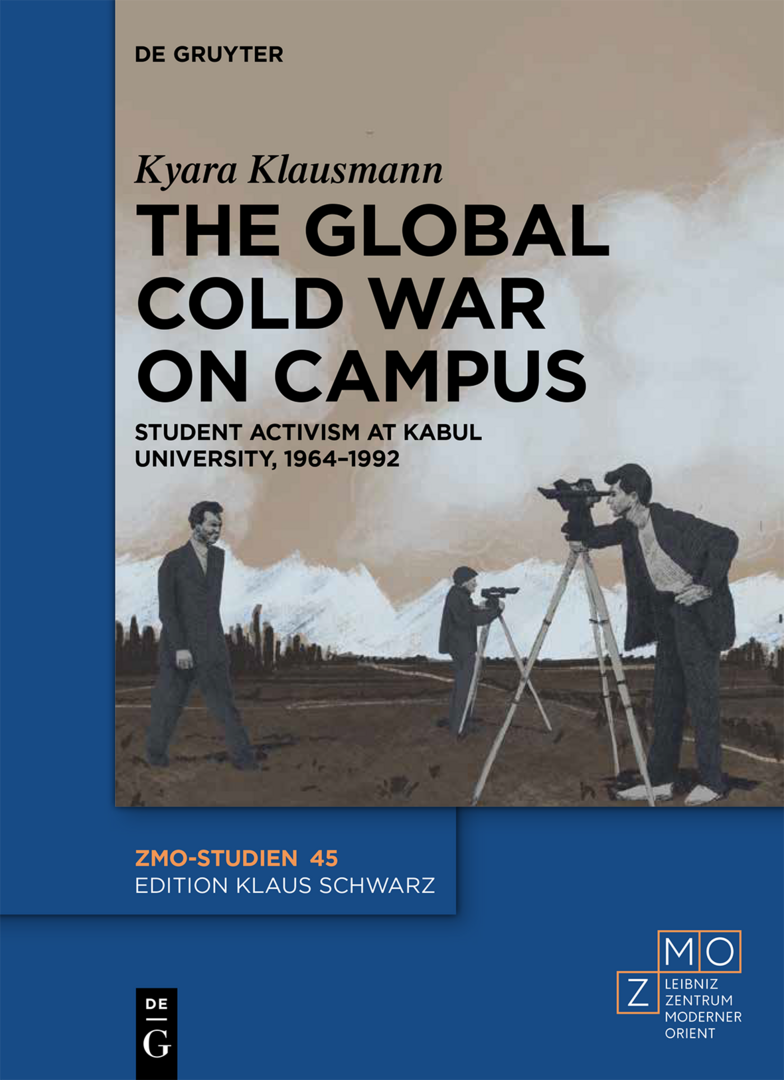
Kyara Klausmann
The Global War on Campus
Student Activism at Kabul University, 1964–1992
How and why did students at Kabul University engage in political activism or refrained from it between 1964 and 1992? Based on oral history interviews with former students, this book reveals how they – as many others around the world at the same time – were galvanized by and disappointed with promises of progress dominating local and international politics. During the 1960s, the international influences on campus encouraged students’ engagement with competing political ideologies. Collective student protest against the monarchy turned into hostilities between opposing political groups within the student body claiming to lead Afghanistan towards independence and prosperity. After the coup d’état by the People’s Democratic Party of Afghanistan (PDPA) in 1978, none of the ideologies which had previously incited students provided hope for a better future anymore. Many students who had fought for the PDPA earlier were repelled by the government’s violence and those who stood up against the regime were persecuted and fled the country. Overall, the dynamics of political activism at Kabul University reflect the deep intertwinement of the Global Cold War and local struggles for inclusion and independence.
Leibniz-Zentrum Moderner Orient
Geisteswissenschaftliche Zentren Berlin e.V.
ZMO-Studien 45
2023
238 Seiten
De Gruyter
ISBN 9783111138046
Aktuelle ZMO-Studie Nr. 44
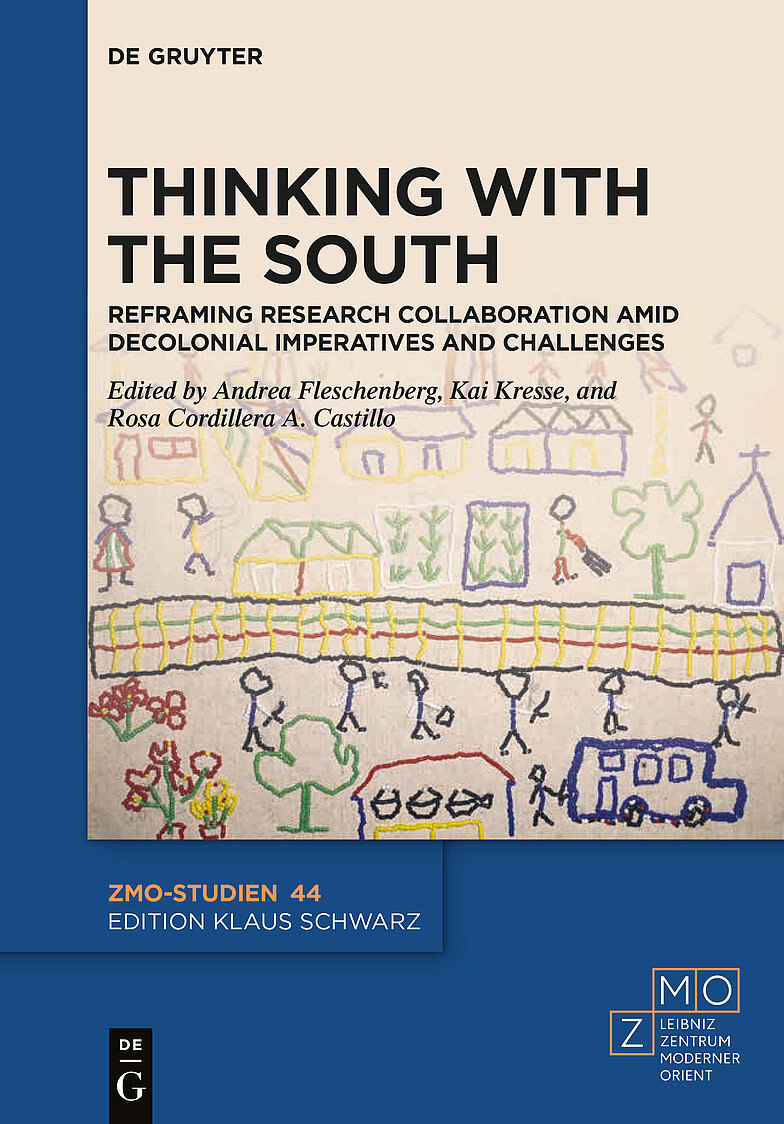
Andrea Fleschenberg, Kai Kresse und Rosa Cordillera Castillo
Thinking with the South
Reframing Research Collaboration amid Decolonial Imperatives and Challenges
This volume brings together a series of discussions by scholars from a range of disciplinary, (trans)regional and epistemic perspectives that came out of the Berlin-based "co2libri" networking initiative, with longstanding collaborative partners based in the global South. "Co2libri" stands for "conceptual collaboration: living borderless research interaction". As an interdisciplinary and transregional oriented initiative, co2libri envisages a multicentric perspective that integrates neglected positions of Southern theory and praxis into the heart of academic conversations. Co2libri’s collaborative endeavor builds on long-standing active connections with partners in Africa, South and Southeast Asia, and the Middle East. Instead of setting an agenda from the North, it proposes to figure out ways forward through collaborative engagement, building on relationships of mutual trust. Using formats that facilitate substantial and open-ended discussion, we are re-thinking theory and method, academic practices, and research ethics, while keeping material inequalities in view.
Contributors to this edited volume are working toward the implementation of various innovative activities, research perspectives and collaboration formats which all subscribe to the principle of dialogue on equal footing with scholars and activists based in divergent positionalities along and beyond the Global North-South divide. In different ways, the authors work toward the goal of producing more adequate, and more sensitive, critical knowledge, and applying a fresh view to approach, methods, and ethical standards. Overall, the volume works, sometimes in exploratory ways, with alternative frames of reference while it presents diverse theorizations of lived experiences.
Leibniz-Zentrum Moderner Orient
Geisteswissenschaftliche Zentren Berlin e.V.
ZMO-Studien 44
2024
311 Seiten
De Gruyter
ISBN 9783110780352
ZMO-Studie Nr. 43
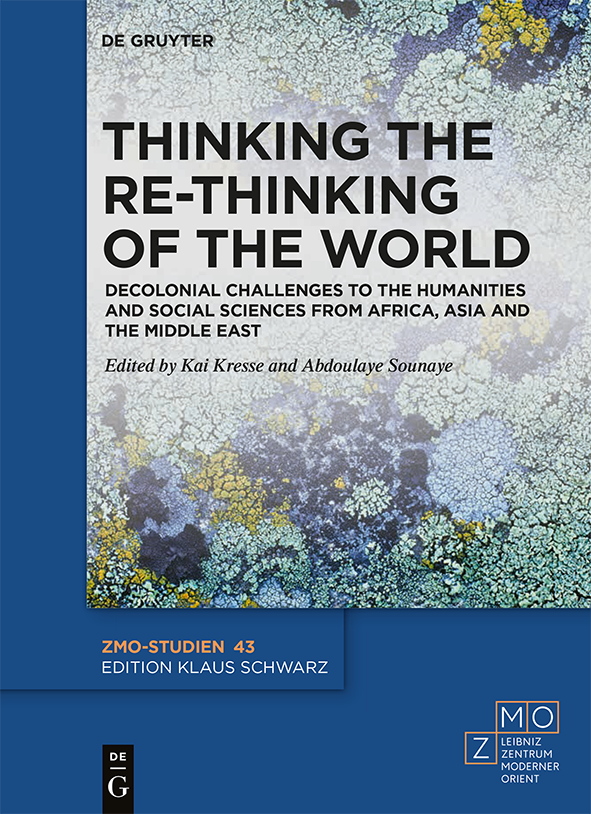
Kai Kresse, Abdoulaye Sounaye
Thinking the Re-Thinking of the World
Decolonial Challenges to the Humanities and Social Sciences from Africa, Asia and the Middle East
As far too many intellectual histories and theoretical contributions from the ‘global South’ remain under-explored, this volume works towards redressing such imbalance. Experienced authors, from the regions concerned, along different disciplinary lines, and with a focus on different historical timeframes, sketch out their perspectives of envisaged transformations. This includes specific case studies and reflexive accounts from African, South Asian, and Middle Eastern contexts. Taking a critical stance on the ongoing dominance of Eurocentrism in academia, the authors present their contributions in relation to current decolonial challenges.
Hereby, they consider intellectual, practical and structural aspects and dimensions, to mark and build their respective positions. From their particular vantage points of (trans)disciplinary and transregional engagement, they sketch out potential pathways for addressing the unfinished business of conceptual decolonization. The specific individual positionalities of the contributors, which are shaped by location and regional perspective as much as in disciplinary, biographical, linguistic, religious, and other terms, are hereby kept in view. Drawing on their significant experiences and insights gained in both the global north and global south, the contributors offer original and innovative models of engagement and theorizing frames that seek to restore and critically engage with intellectual practices from particular regions and transregional contexts in Africa, South Asia, and the Middle East.
Leibniz-Zentrum Moderner Orient
Geisteswissenschaftliche Zentren Berlin e.V.
ZMO-Studien 43
2022
230 Seiten
De Gruyter
ISBN 9783110738094
ZMO-Studie Nr. 42
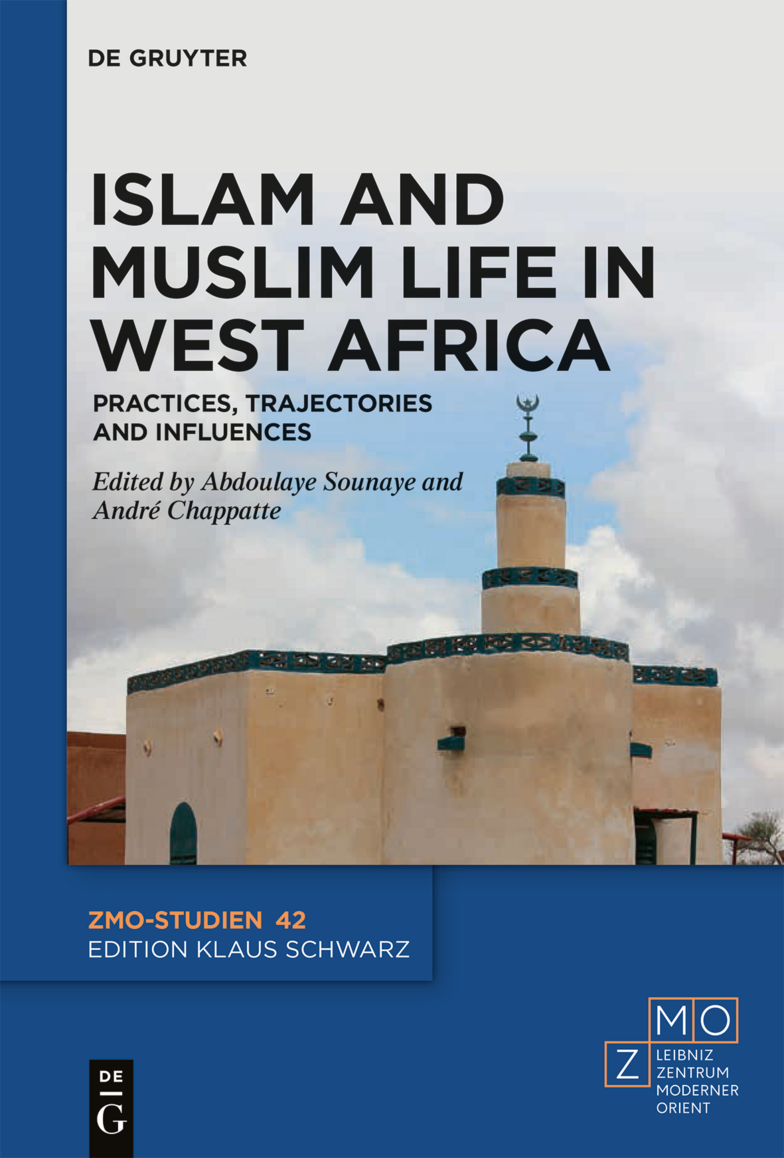
Abdoulaye Sounaye, André Chappatte
Islam and Muslim Life in West Africa
Practices, Trajectories and Influences
The book offers an examination of issues, institutions and actors that have become central to Muslim life in the region. Focusing on leadership, authority, law, gender, media, aesthetics, radicalization and cooperation, it offers insights into processes that reshape power structures and the experience of being Muslim. It makes room for perspectives from the region in an academic world shaped by scholarship mostly from Europe and America. parcel of such social conflicts and transformations, its role being neither one of resistance against power nor of guidance towards norms, but rather one of open-ended complicity.
Leibniz-Zentrum Moderner Orient
Geisteswissenschaftliche Zentren Berlin e.V.
ZMO-Studien 42
2022
236 Seiten
De Gruyter
ISBN 9783110738124
ZMO-Studie Nr. 41
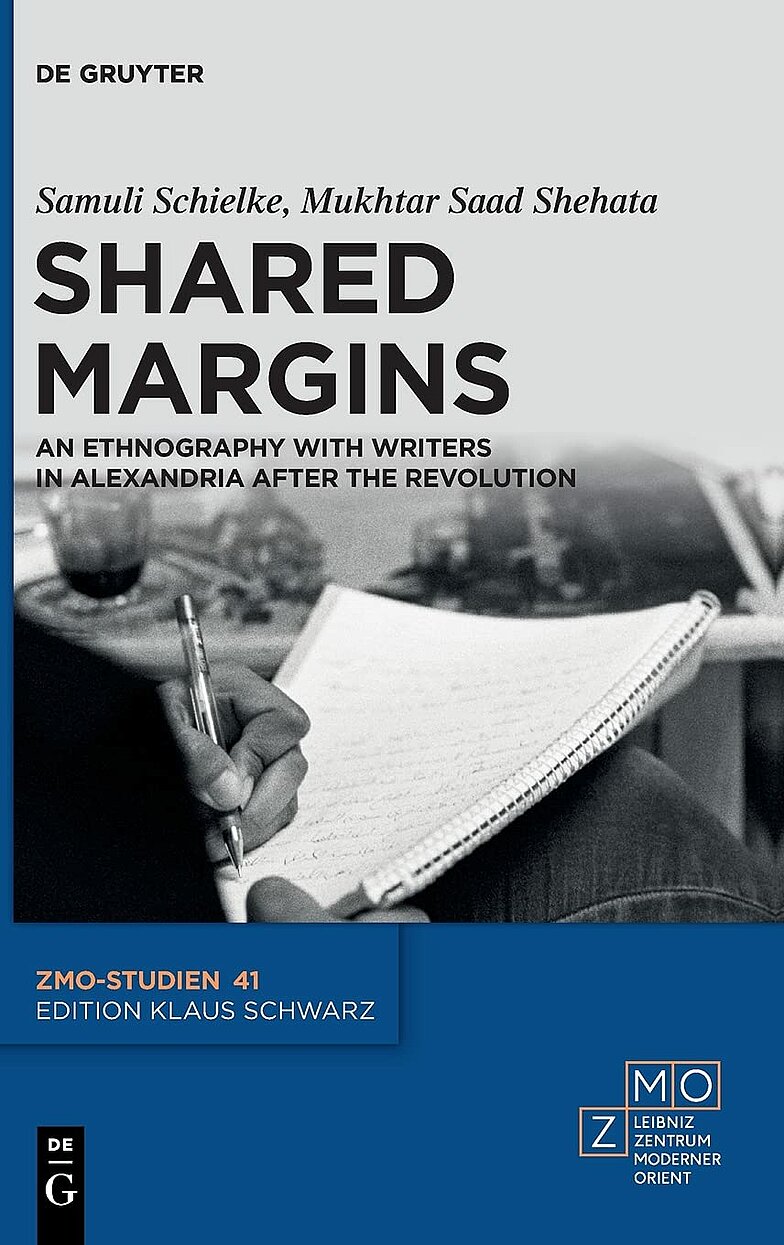
Samuli Schielke und Mukhtar Saad Shehata
Shared Margins
An Ethnography with Writers in Alexandria after the Revolution
Shared Margins tells of writers, writing, and literary milieus in Alexandria, Egypt’s second city. It de-centres cosmopolitan avant-gardes and secular-revolutionary aesthetics that have been intensively documented and studied since 2011. Instead, it offers a fieldwork-based account of various milieus and styles, and their common grounds and lines of division.
Structured in two parts, Shared Margins gives an account of literature as a social practice embedded in milieus that at once enable and limit literary imagination, and of a life-worldly experience of plurality in absence of pluralism that marks literary engagements with the intimate and social realities of Alexandria after 2011.
Literary writing, this book argues, has marginality as an at once enabling and limiting condition. It provides shared spaces of imaginary excess that may go beyond the taken-for-granted of a societal milieu, and yet are never unlimited. Literary imagination is part and parcel of such social conflicts and transformations, its role being neither one of resistance against power nor of guidance towards norms, but rather one of open-ended complicity.
Leibniz-Zentrum Moderner Orient
Geisteswissenschaftliche Zentren Berlin e.V.
ZMO-Studien 41
2021
272 Seiten
De Gruyter
ISBN 9783110726770
ZMO-Studie Nr. 40
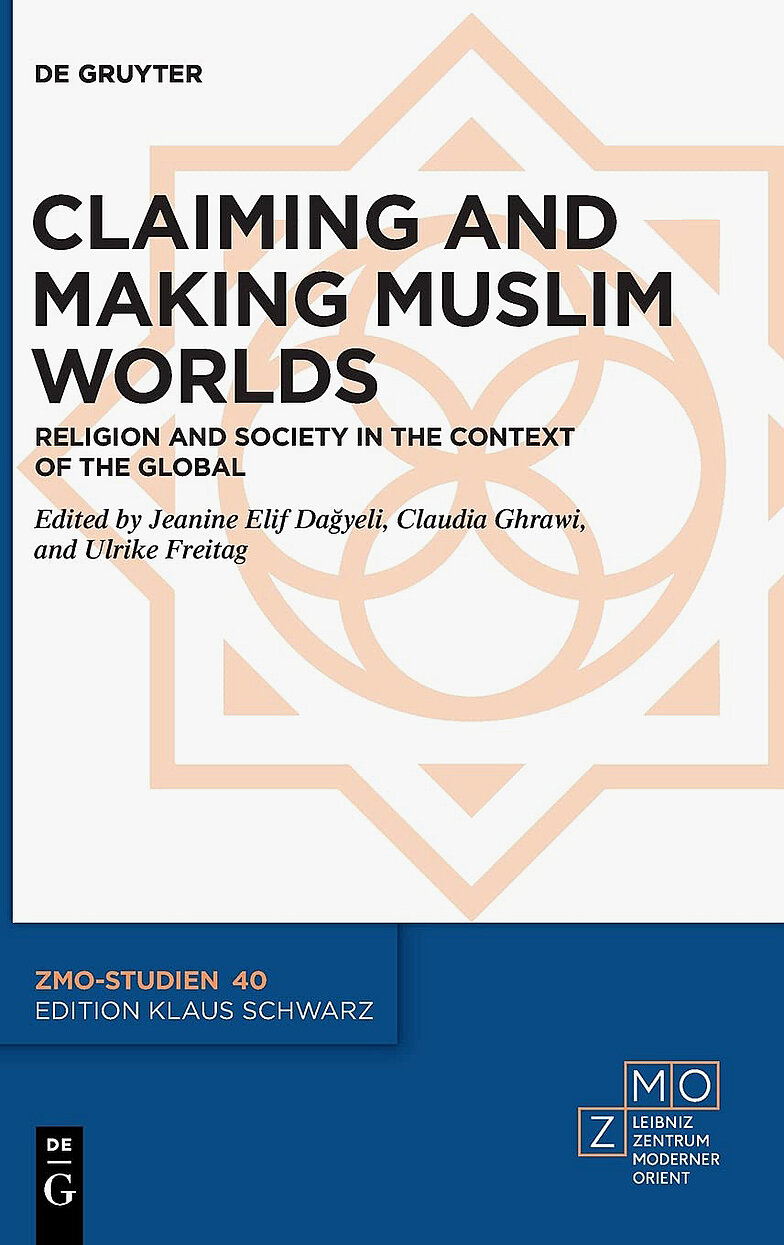
Claiming and Making Muslim Worlds
Religion and Society in the Context of the Global
To what extent can Islam be localized in an increasingly interconnected world? The contributions to this volume investigate different facets of Muslim lives in the context of increasingly dense transregional connections, highlighting how the circulation of ideas about ‘Muslimness’ contributed to the shaping of specific ideas about what constitutes Islam and its role in society and politics. Infrastructural changes have prompted the intensification of scholarly and trade networks, prompted the circulation of new literary genres or shaped stereotypical images of Muslims. This, in turn, had consequences in widely differing fields such as self-representation and governance of Muslims. The contributions in this volume explore this issue in geographical contexts ranging from South Asia to Europe and the US. Coming from the disciplines of history, anthropology, religious studies, literary studies and political science, the authors collectively demonstrate the need to combine a translocal perspective with very specific local and historical constellations. The book complicates conventional academic divisions and invites to think in historically specific translocal contexts.
Leibniz-Zentrum Moderner Orient
Geisteswissenschaftliche Zentren Berlin e.V.
ZMO-Studien 40
2021
299 Seiten
De Gruyter
ISBN 978-3-11-0726534
ZMO-Studien Nr. 39
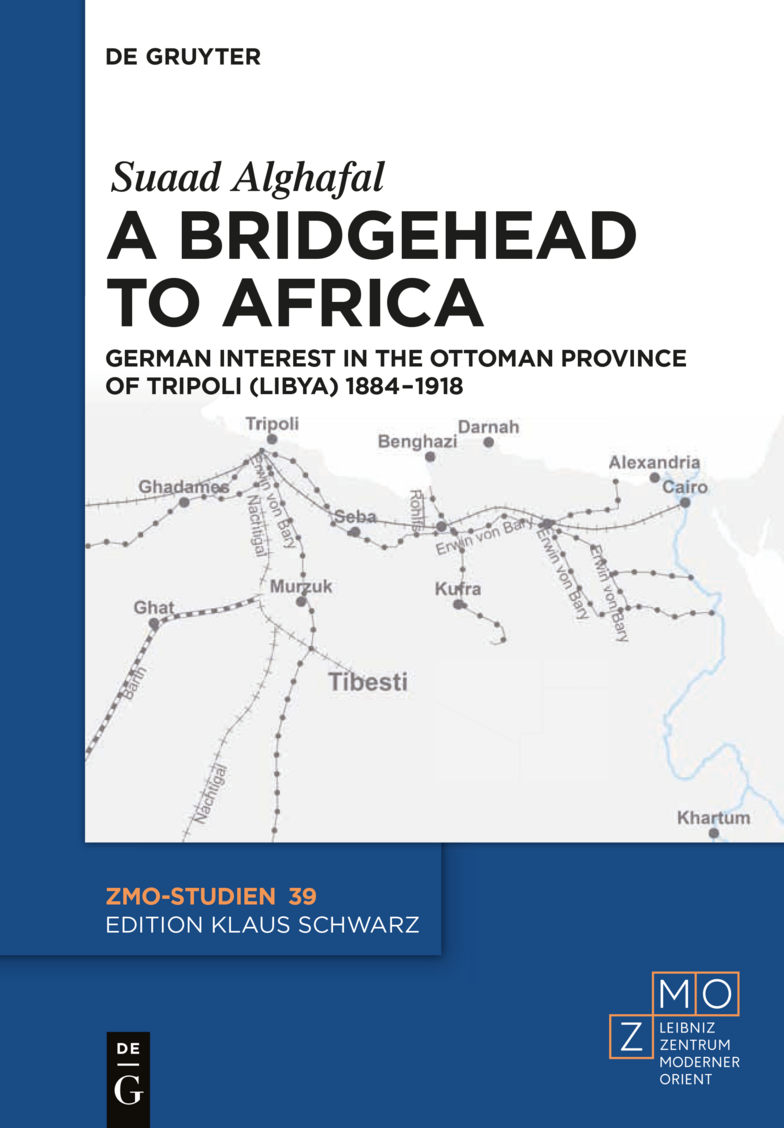
A Bridgehead to Africa
German Interest in the Ottoman Province of Tripoli (Libya) 1884–1918
This monograph analyses the role of the province of Tripoli, Libya, in the context of German foreign politics with a focus on the period between 1884 and 1918. Suaad Alghafal examines the German military, political and economic strategy, and sheds lights on the international events that provided the setting for the German policy towards Libya, particularly the European ‘Scramble for Africa’.
Leibniz-Zentrum Moderner Orient
Geisteswissenschaftliche Zentren Berlin e.V.
ZMO-Studien 39
2021
242 Seiten
De Gruyter
ISBN 978-3-11-0684964
ZMO-Studie Nr. 38
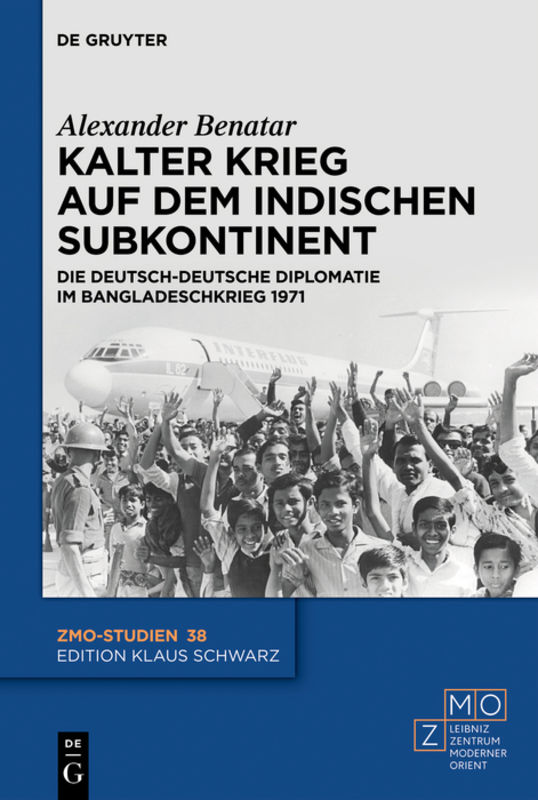
Alexander Benatar
Kalter Krieg auf dem indischen Subkontinent
Die deutsch-deutsche Diplomatie im Bangladeschkrieg 1971
In den Jahren 1971/72 waren in Mitteleuropa und Südasien zwei gegenläufige Bewegungen zu beobachten. Während die deutsch-deutsche Entspannungspolitik den Ost-West-Konflikt zu überwinden suchte, entspann sich zwischen den beiden Nachfolgestaaten Britisch-Indiens ein Krieg, der zur Teilung Pakistans und Gründung Bangladeschs führen sollte. Indien unterstützte die bengalische Unabhängigkeitsbewegung gegen die pakistanische Zentralregierung.
Entscheidend sind hierbei die unterschiedlichen Block-Allianzen der jeweils agierenden Nationalstaaten: Waren Bundesrepublik und DDR ihre Loyalitäten im Kalten Krieg recht klar, so blieben sie im bündnisfreien Indien bewusst weitaus unklarer. Dennoch war mit Abschluss des Indisch-Sowjetischen Freundschaftsvertrages im August 1971 eine (vor allem sicherheitspolitische) Annäherung der indischen Regierung an die UdSSR zu beobachten, derweil Pakistan schon früher zu einem wichtigen strategischen Partner der USA auf dem Subkontinent avanciert war.
Ausgehend von der Hypothese, dass für Bundesrepublik und DDR Anfang der 1970er Jahre die Auseinandersetzung miteinander ihre Loyalitäten im Kalten Krieg überwog, untersucht die vorliegende Arbeit die Haltung der beiden deutschen Staaten im Bangladeschkrieg.
Leibniz-Zentrum Moderner Orient
Geisteswissenschaftliche Zentren Berlin e.V.
ZMO-Studien 38
2020
257 Seiten
De Gruyter
ISBN 978-3-11-068085-0
lieferbar; 79,95 Euro
ZMO-Studie Nr. 37
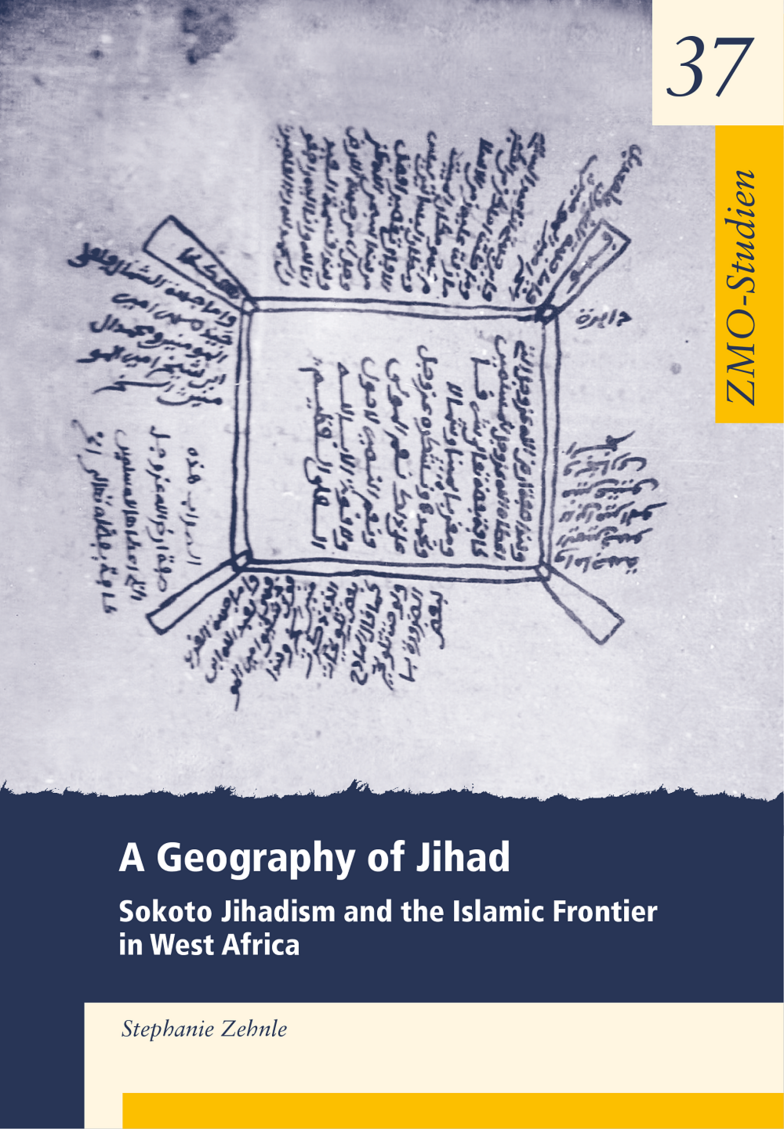
Stephanie Zehnle
A Geography of Jihad
Sokoto Jihadism and the Islamic Frontier in West Africa
This book addresses the Jihad movement that created the largest African state of the 19th century: the Sokoto Caliphate, existing for 99 years from 1804 until its military defeat by European colonial troops in 1903. The author carves out the entanglements of jihadist ideology and warfare with geographical concepts at Africa’s periphery of the Islamic world: geographical knowledge about the boundary between the “Land of Islam” and the “Land of War”; the pre-colonial construction of “the Muslim” and “the unbeliever”; and the transfer of ideas between political elites and mobile actors (traders, pilgrims, slaves, soldiers), whose reports helped shape new definitions of the African frontier of Islam. Research for this book is based on the study of a very wide range of Arabic and West African (Hausa, Fulfulde) manuscripts. Their policies reveal the persistent reciprocity of jihadist warfare and territorial statehood, of Africa and the Middle East.
Leibniz-Zentrum Moderner Orient
Geisteswissenschaftliche Zentren Berlin e.V.
ZMO-Studien 37
2020
718 Seiten
De Gruyter
ISBN 978-3-11-067536-8
lieferbar; 59 Euro
ZMO-Studie Nr. 36
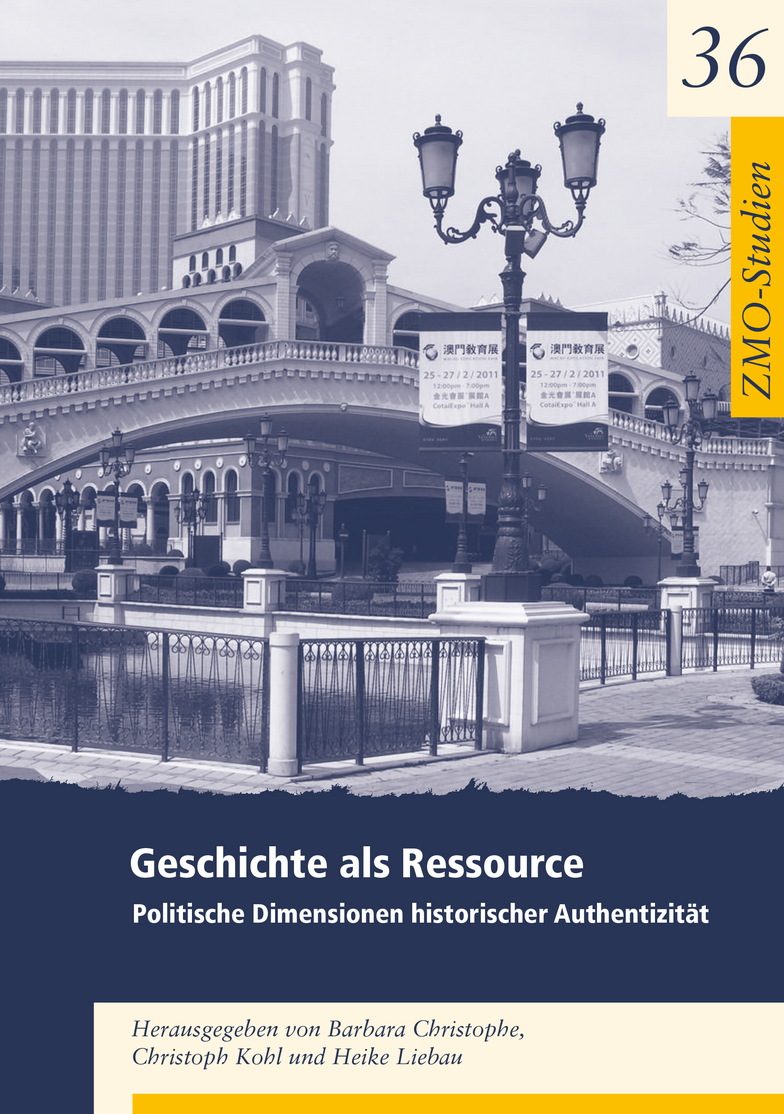
Barbara Christophe, Christoph Kohl und
Heike Liebau (Hrsg.)
Geschichte als Ressource
Politische Dimensionen historischer Authentizität
Wann, wie und durch wen wird Geschichte zu einer politischen Ressource? Welche Rolle spielen dabei Prozesse und Praktiken des Authentisierens historischer Ereignisse, Abläufe oder Persönlichkeiten? Und welche Ziele verfolgen die beteiligten Akteure? Gegenwärtig wird die Kontrolle über die Deutung von Vergangenheiten zu einem umstrittenen Gut im Kampf um politische Macht und ökonomische Ressourcen. Gerade in Krisenzeiten, aber auch angesichts konkurrierender medialer Einflüsse werden Behauptungen von Authentizität genutzt, um Ansprüche auf historische »Wahrheiten« oder »richtige« Erinnerungen durchzusetzen. Die Autorinnen und Autoren nehmen Transformationsprozesse und Krisensituationen in postkolonialen, postsozialistischen und postimperialen Gesellschaften in Europa, Asien und Afrika in den Blick und analysieren Prozesse des Authentisierens sowie konkurrierende Ansprüche auf Authentizität. Sie beleuchten Zusammen hänge zwischen Authentizitätsbehauptungen, historischen Erfahrungen und Machtansprüchen. Nicht die »Geschichte« oder die »Erinnerung« werden behandelt. Vielmehr ermöglicht der Blick auf die Verflochtenheit lokaler, nationaler und transnationaler Ebenen eine Analyse der Beziehungen zwischen Produktion und Rezeption historischer Authentizität.
Leibniz-Zentrum Moderner Orient
Geisteswissenschaftliche Zentren Berlin e.V.
Reihe: ZMO-STUDIEN 36
2017
320 Seiten
Taschenbuch
ISBN 978-3-87997-726-0
lieferbar; 32 Euro
Weitere ZMO-Studien
Alle weiteren ZMO-Studien sowie Links zu Rezensionen finden Sie im Institutionellen Repositorium ZMO.